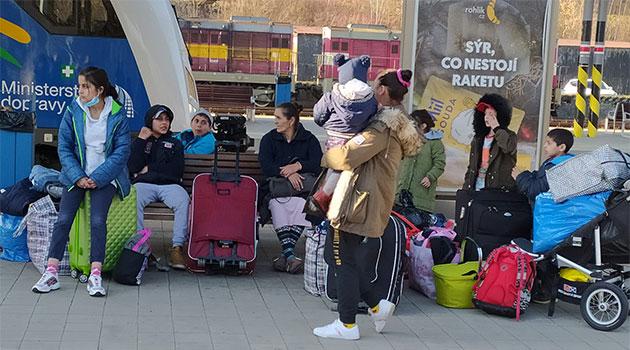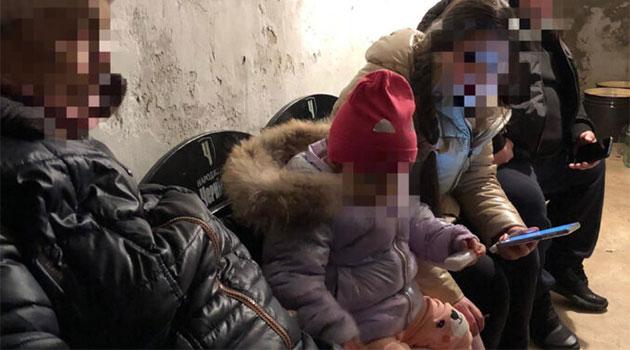Civil society members of Czech Govt Roma Council call for solidarity with refugees, 500 Romani children and women have arrived in Czech Republic from Ukraine

For the time being about 500 Romani refugees from Ukraine have arrived in the Czech Republic fleeing Russia’s war there. Alica Sigmund Heráková, a civil society member of the Czech Government Council on Roma Minority Affairs, has informed the Czech News Agency that most of them are children and women.
Heráková says some of the Romani refugees are in South Moravia, quite a few have headed to Karlovy Vary, and some are near Mladá Boleslav. Several civil society members of the Council are directly involved in aiding refugees.
Civil society members of the Council are part of an Action Group for addressing the needs of Romani refugees from Ukraine and, as an institutional partner, are communicating with the Refugee Facilities Administration of the Interior Ministry, the Alien Police, the non-profit sector and other entities providing currently needed assistance. “Individual members of the Council, such as Josef Stojka in Ostrava, Štefan Oláh in northern Bohemia, or Alena Drbohlavová Gronzíková in Břeclav are directly involved in addressing the situation and in providing humanitarian assistance in the field. Other members such as Jan Husák or Alica Sigmund Heráková communicate with non-profit organizations and representatives of the Czech state,” reads a statement from the civil society members that has been sent to the Romea.cz news server.
According to civil society Council member Jan Husák, most of the refugees of Romani origin come from the western part of Ukraine and from the environs of Uzhhorod. Although the western part has not been afflicted by the war to the same degree as the rest of the country, the situation in that region is by no means easy, according to Heráková.
“The humanitarian situation is complex there. They are running out of food. People are afraid and different false alarms are spreading,” Heráková said.
Many civilians in Ukraine have fled the eastern part of the country, where more of the fighting is happening, for the western part. What is more, many of the Romani refugees from Ukraine in the Czech Republic speak only the Romanes language.
Civil society members of the Council who speak Romanes are involved with the coordination of interpreters and translators between Czech and Romanes. “Many of them speak Romanes only, so involving Romani men and women to interpret is crucial in this situation, both for the refugees themselves and for those providing social and humanitarian aid,” Husák said.
Romanes speakers performing community service work could assist these efforts, for example. “In cooperation with the Deputy Public Defender of Rights, Monika Šimůnková, we are negotiating with the Labor and Social Affairs Ministry to make use of the institution of community service in the form of interpretation and support to social workers in the field who are in contact with refugees,” said Alena Drbohlavová Gronzíková, also a civil society member of the Czech Government Council for Romani Minority Affairs.
According to Gronzíková, the situation is demanding both for nonprofit organizations and the state. “In our view it makes a great deal of sense to involve not just Romani volunteers, but also those who are fulfilling their obligation to do community service work. That doesn’t have to take the form of street-sweeping, which we are accustomed to seeing Romani people do. The Roma have unique knowledge they are able to offer in this context that will benefit society,” she said.
The civil society members are also calling on everybody, including Romani communities, to act in solidarity with all of the refugees fleeing war-torn Ukraine. “We fully support Czech Government policy in relation to Russia’s war on Ukraine and its disinformation propaganda in the Czech Republic,” said Council Vice-Chair Zdeněk Guži.
“We support the Government of Ukraine in defending itself against this unjustified attack. We believe it is immoral and shameful to deny material or moral support to anybody fleeing any war zone,” Guži said.
According to another civil society member of the Council, Tomáš Ščuka, Romani people and others in Czech society who are at risk of poverty and suffering from social exclusion are concerned about the impact the influx of refugees from Ukraine will have on their own personal situations. “The sharp increase in prices for energy and groceries is felt most of all by exactly such groups who are vulnerable. Despite this humanitarian crisis we must be aware that we cannot forget about the needs of people at risk of poverty in the Czech Republic. In that sense it is necessary to support all declarations leading to calming the situation instead of escalating it,” Ščuka said.
